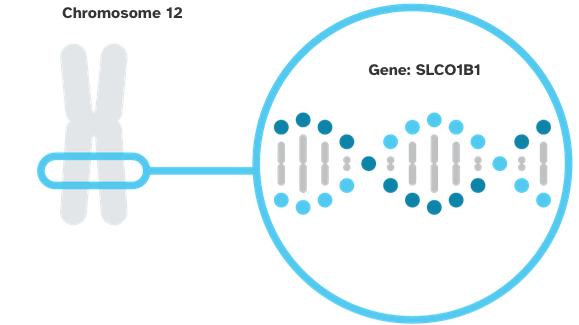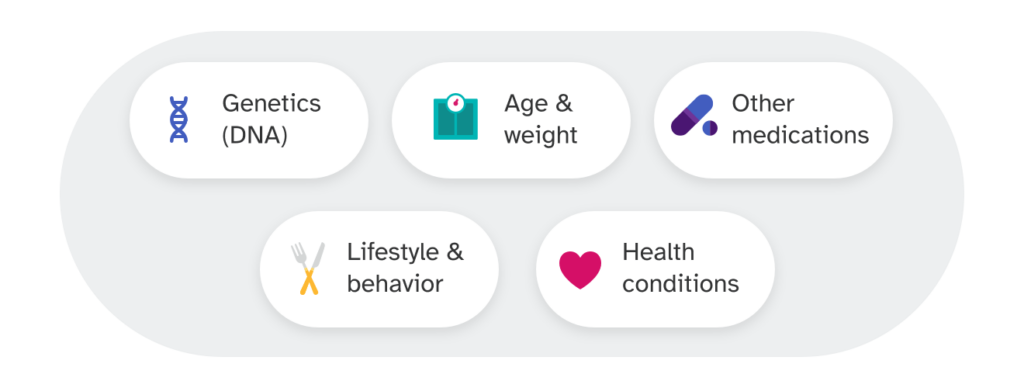Genetics is a big reason why many millions of people respond differently to commonly prescribed medications, and yet few of us are screened to detect these genetic differences.
This week 23andMe added another in a suite of reports that examine how a person’s genetics may impact their response to certain medications, and their chance of experiencing possible side effects. These are the first and only direct-to-consumer pharmacogenetic reports authorized by the FDA.

Simvastatin Medication Insight report
The updated Pharmacogenetics report for SLCO1B1 Drug Transport with a new Medication Insight Report* is available for 23andMe+ members. It looks at how individuals respond to simvastatin, sold under the brand names Flolipid® and Zocor.® It provides an easy-to-read message telling them whether they have an increased chance of experiencing side effects. Simvastatin is a statin drug used to lower cholesterol in the blood and reduce the risk of heart attacks, strokes, or other heart problems.
One in four Americans over 40 uses a statin to lower their cholesterol, as reported by American Heart Association scientists. About 8 million people in the US were prescribed the statin simvastatin in 2020. This amounts to about 36 million prescriptions, making it among the most prescribed medications in the United States, according to ClinCalc DrugStats database. ClinCalc provides prescription drug utilization data estimates for patients in the United States that is drawn from government sources including the NIH and FDA.
Genetic differences in the SLCO1B1 gene affect a protein involved in moving some medications, including statins, from the blood to the liver. The liver is where they are processed and removed from the body.
When the gene function is reduced, statin levels in the blood rise. This increases the likelihood of side effects like muscle pain, weakness, or both, a condition known as myopathy.

Muscle pain or weakness is one of the most common side effects of statins, including simvastatin. About one in ten people on statins stop using them, according to a study from the American Heart Association. About 60 percent report of those who stopped said they stopped because of muscle pain, according to research by scientists at the St. Louis University School of Medicine. Having one or two copies of the SLCO1B1 variant included in 23andMe’s Pharmacogenetics report increases the risk of developing simvastatin-associated myopathy from two to six times. Importantly, studies have shown that patients who received SLCO1B1 genotype-guided therapy were more likely to take their medication, had improved perceptions of statin therapy, and had better health outcomes.
Drug Response
People respond differently to the same medicine due to many factors such as age, weight, liver and kidney function, diet, or even other drugs they might be taking. But we have also known for some time that for many medications, genetic differences also play a role in their effectiveness.
In some cases, those differences may also lead to adverse drug reactions.

About half of the people in the United States use at least one prescription drug in any given month, according to data from the CDC. Millions of these individuals have one common genetic variant that impacts how they process those medications. This could impact how they respond to a blood thinner, an antidepressant, or pain medication. The list of medications that the Food and Drug Administration labels with a known genetic variant that impacts their efficacy or chance for side effects now includes hundreds of drugs. That list continues to grow. Knowing beforehand whether a prescription drug is likely to work, or trigger an adverse reaction, offers a tremendous public health benefit.
A recent European study involving almost 7,000 patients in seven European countries over three years noted the potential of using this information in care. It found that using genetic screening to identify people with variants that affected how they processed a medication lowered the risk of patients having an adverse drug reaction by 30 percent. The study was led by U-PGx, a consortium of researchers from more than a dozen universities and research institutions in Europe and the UK.
23andMe’s Pharmacogenetics Reports*
23andMe+ Membership includes information about how your DNA may affect the processing of almost two dozen medications. Among them are drugs used in treatments that range from depression and high cholesterol, to certain medications used in chemotherapy. The reports examine how variants in three genes — CYP2C19, DPYD, and SLCO1B1 — affect the body’s ability to metabolize or transport those medications.
Under the FDA authorization, there is no additional confirmatory testing requirement for the SLCO1B1 Drug Transport report. A healthcare provider can use the results from the report to guide care. Remember that other factors besides your genetics can also affect how your body processes medications. In addition, customers should not change their medications without first consulting their healthcare provider.
Find Out More
23andMe+ members can view their pharmacogenetics reports here.
23andMe Health + Ancestry Service customers on the current genotyping chip can receive this report and 35+ other reports by joining 23andMe+ from within their accounts link here to upgrade.
Not a 23andMe+ customer yet? Learn more about what 23andMe offers here.
Note:
*23andMe PGS Pharmacogenetics reports: The 23andMe test uses qualitative genotyping to detect 3 variants in the CYP2C19 gene, 2 variants in the DPYD gene and 1 variant in the SLCO1B1 gene in the genomic DNA of adults from saliva for the purpose of reporting and interpreting information about the processing of certain therapeutics to inform discussions with a healthcare professional. It does not describe if a person will or will not respond to a particular therapeutic. Our CYP2C19 Pharmacogenetics report provides certain information about variants associated with metabolism of some therapeutics and provides interpretive drug information regarding the potential effect of citalopram and clopidogrel therapy.
Our SLCO1B1 Pharmacogenetics report provides certain information about variants associated with the processing of some therapeutics and provides interpretive drug information regarding the potential effect of simvastatin therapy. Our DPYD Pharmacogenetics report does not describe the association between detected variants and any specific therapeutic. Results for DPYD and certain CYP2C19 results should be confirmed by an independent genetic test prescribed by your own healthcare provider before taking any medical action. Warning: Test information should not be used to start, stop, or change any course of treatment and does not test for all possible variants that may affect metabolism or protein function. The PGS test is not a substitute for visits to a healthcare professional. Making changes to your current regimen can lead to harmful side effects or reduced intended benefits of your medication, therefore consult with your healthcare professional before taking any medical action. For important information and limitations regarding Pharmacogenetic reports, visit www.23andme.com/test-info.